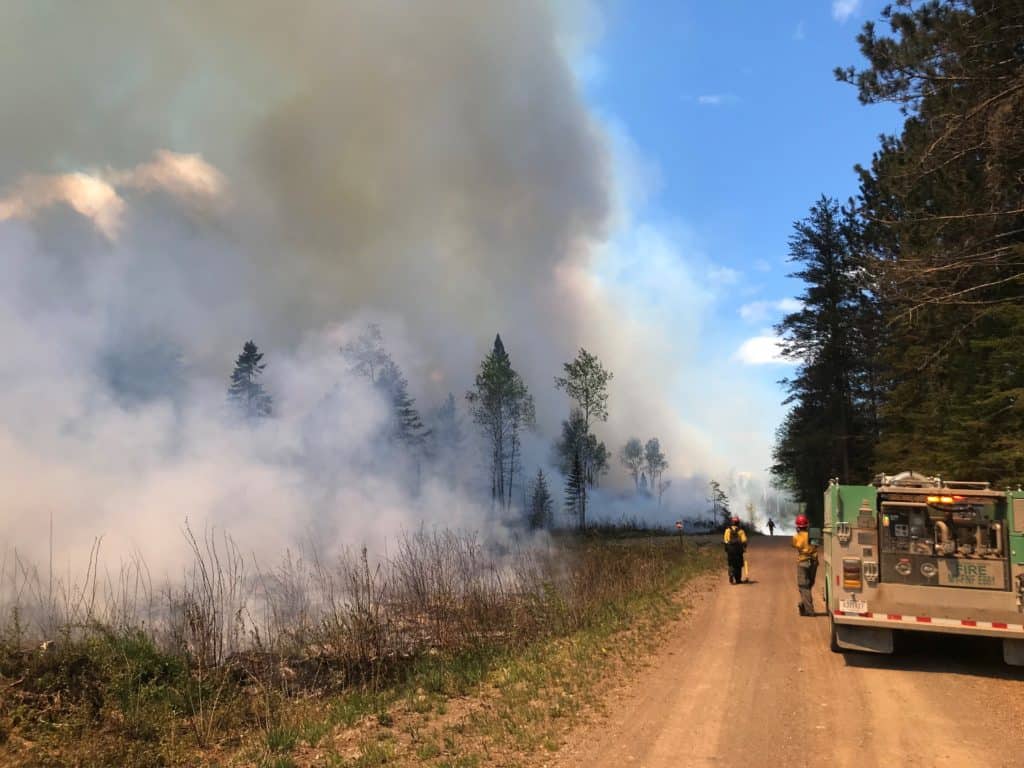
The Superior National Forest has cancelled all its planned prescribed fires this spring due to the coronavirus pandemic. The Forest Service uses fire to help manage the forest, create wildlife habitat, and prevent the possible spread of wildfires.
But the agency says its top priority in all fires is protecting public health. Smoke from fires can be significant, and could cause additional respiratory problems for people suffering from coronavirus.
“This decision to suspend prescribed burning will prevent any potential effects from smoke that might further worsen conditions for those who are at risk in our communities,” the Superior National Forest announced in a press release. “In addition we are working to reduce exposure for our firefighters whose first priority will be the suppression of wildfires.”
Fire crews — who live and work in tight quarters for extended periods with other firefighters from around the country — could exacerbate the spread of the virus. Several federal agencies have formed a task force to develop techniques firefighters can use this season to reduce the risk of COVID-19.
Last year, crews completed at least a dozen burns across the Superior National Forest, in both spring and fall.
Three major landscape-level projects that include prescribed fire are currently active on the Superior National Forest: the Beaver River Project (near Silver Bay), the HiLo Project (near the Echo Trail), and the Jeanette Project (LaCroix District). The Tofte Area Project is also in the final analysis stage.
The entire Rocky Mountain Region of the Forest Service also halted all prescribed burning on March 21, with several other National Forests and regions following suit.
Burning questions
The U.S. Forest Service has not yet issued formal guidance for the agency’s fire program, leaving decisions up to local managers. One prominent voice in the field has criticized the agency’s top officials for failing to provide critical leadership.
“Instead of leaders making tough decisions about how to protect personnel they are backing away and ordering them to be made at the field level,” longtime firefighter and fire crew manager Bill Gabbert wrote on Wildfire Today. He said it’s critical that wildland firefighters start getting tested for coronavirus regularly so the virus can be contained without affection the nation’s ability to manage wildfires.
The Superior National Forest says it remains ready to respond to wildfires, noting that firefighters are trained to quickly adapt to changing circumstances.
On the Forest Service’s website, three factors influencing fire management during the pandemic are described: “The ability to maintain fire responder viability and sustainability; potential smoke impacts to communities from prescribed fire and how that interacts with COVID-19 effects; and the ability to use local resources so inter-state travel is not necessary.”
A key strategy to fighting fires this season will be rapid response, ideally using as many aircraft as possible to quickly put out fires before they require the hundreds or thousands of people need to respond to a large conflagration.
Statewide restrictions
The entire state of Minnesota is currently under fairly restrictive spring burning restrictions, partially due to COVID-19. The Minnesota Department of Natural Resources is implementing burning restrictions as soon as counties lose their snow cover and local fire wardens are not issuing permits. Most of the state is under a “Restricted – Variance Needed” classification.
The reasons for the state-level restrictions are similar to the Forest Service’s decision.
“DNR is working to reduce additional risks and stressors on the emergency response network to assure maximum availability for COVID-19 response,” the agency says.
The DNR is only granting variance permits for limited prescribed burning and commercial activities: agricultural field and construction site preparation.
Individuals are urged to report any fires they observe by calling 911. Quickly extinguishing any fires is imperative this year to prevent large fires that require large numbers of firefighters.
“If in doubt, report a fire. An early report helps keep fires small.”

